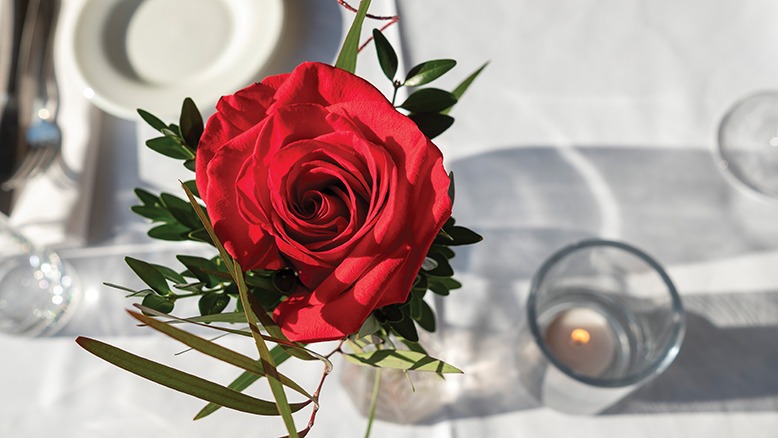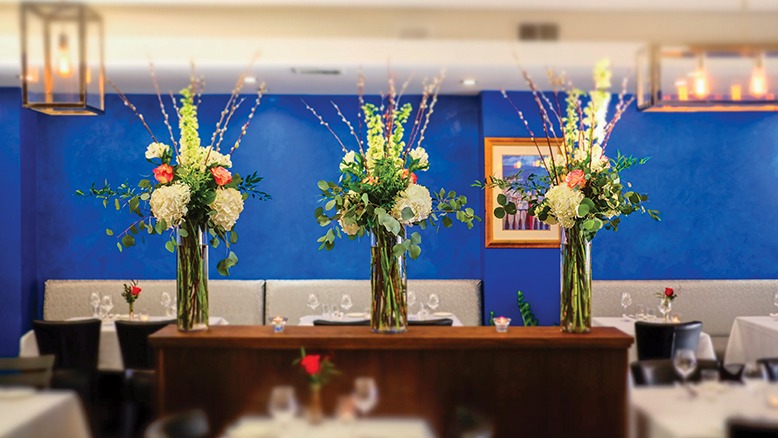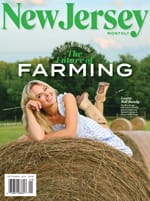
James DeSisto of Laboratorio Kitchen in Montclair spends lavishly on flowers and says customers are appreciative. Photo by Scott Jones
When Black Eyed Susans first opened in 2010, chef partners Ashley Pellagrino and her husband, Christopher Sanchez, decorated inside and out with flowers and herbs. Pellagrino grew many of them herself, tending the beds in the parking lot, hanging flower boxes over the porch railings and tucking containers with blossoms and tendrils in every nook.
In 2020, when the pandemic shifted dining outdoors, Pellagrino turned to local growers, including Reynolds Garden Shop in Manahawkin and Pinelands Produce in Pemberton. She created a garden area with picnic seating. Nasturtiums and lemon verbena thrived alongside rosemary, oregano, lemongrass and a variety of basils. Fresh flowers filled the restrooms and graced the host stand.
As indoor dining resumed, Pellagrino continued to emphasize flowers and plants, with vases of yarrow and eucalyptus in fall and winter. This spring, diners can expect daffodils and tulips. “It all starts with a mood when you step out of your car and are greeted by aromatic herbs and beautiful flowers,” she says. “We use a lot of edible flowers and fresh herbs in our dishes, and we want that kind of atmosphere in the restaurant.”
At Laboratorio Kitchen, an eclectic American restaurant in Montclair, chef/owner James DeSisto says flowers add a “wow.” He says he spends about $1,500 a month on flowers and considers it part of his advertising budget. “Everybody loves to see a big bouquet when they check in.”

A rose-adorned tabletop at Laboratorio Kitchen in Montclair. Photo by Scott Jones
A 2005 Rutgers study supports that view. Psychology professor Jeannette Haviland-Jones and her husband, genetics professor Terry McGuire, gave each participant a decorative candle, a fruit basket or a bouquet. The most effusive reactions came from those who got flowers.
Althea MacDonald, a New Brunswick–based horticultural therapist, notes that “contact with nature, including a bouquet of flowers, improves the mood and reduces stress.”
The Verona-based florist Louisa Amabile Testa supplies Laboratorio Kitchen with bud vases every week. “It adds a level of elegance to a nice place,” she says. “It’s better than fake flowers or a battery-operated candle, and people recognize the difference.”
Testa acknowledges that flowers are a luxury some restaurants can no longer afford. “We were projecting our largest year in 2020, and it still gets me choked up to think about it,” Testa says. “March 9, 2020, we did a $10,000 bar mitzvah, and the next day, I had 200 emails, and the rest of my jobs were canceled.” That included restaurant work in Montclair and Totowa.

“Everybody loves to see a big bouquet when they check in,” says Laboratorio Kitchen’s James DeSisto. Photo by Scott Jones
At upscale restaurants such as the Highlawn in West Orange—which recently landed a spot on the NJM Best New Restaurants list—flowers are still considered essential. “The atmosphere is so much the reason people come here,” says Anthony Frungillo, owner of the Highlawn. “It’s just as important as linens on the table.” The Highlawn spends about $600 a week on the blooms, he says. “In our foyer, we have a showcase piece, a big floral display. People take pictures of it, then stand in front of it and take selfies.”
“Flowers warm up the table and are a conversation starter,” says Anna Coy of Verona’s Blooms in Hand, florist to the Highlawn. When Coy designs a table arrangement, she pictures the customers who will see it. “I don’t want to make it top-heavy, because people are klutzy and it can spill,” she says. “And I use less scented flowers, because I don’t want to mask what the chefs are doing.”
In Cherry Hill, flowers and food share the spotlight at Café Flora, a combination flower shop and café owned by Christian Rattell and his husband, Jason Hind. “People grab a coffee and get a bouquet,” Rattell explains. “Or they’ll take a seat, order a crêpe, and see the flowers on the table. I love the idea of cross-marketing.”
Café Flora even has a Ripples machine, which imprints a leaf design in the foam of a cappuccino or latte, emphasizing the flowers available for sale. Although Café Flora supplies hotels and offices with flowers, it is primarily a retail florist.
“We have regulars at the cafe,” Rattell says, “and we are beginning to get regulars who buy flowers as well, because they see them every time they come in.”
Coy, the florist for the Highlawn, would consider Café Flora’s business model effective cross-promotion. “It’s nice to have a partnership between a restaurant and florist,” she says. “On social media, you can share images of displays in restaurants and tag each other. It helps both businesses.”
Supplying a restaurant, says florist Testa, might bring in enough to pay her phone bill, but it’s not enough to make a living. “It’s more about getting the word out,” she says. “People notice the flowers, see where they come from, and they might remember me.”
And does the average customer take notice of a vase of flowers on the table? “I know they notice because I see them,” says DeSisto. “Some customers touch it to make sure it’s real. And they’re very happy about finding real flowers there.”



